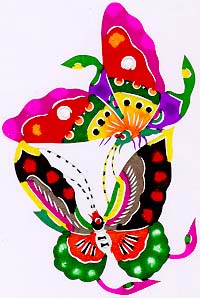Chinese Culture >> Chinese Handicrafts >> Chinese Papercuts
Introduction to Chinese Paper cuts
 Chinese
papercuts refer to
Chinese handicrafts made by cutting paper with
scissors to form different patterns and pasting them on walls, windows, doors
and ceilings. With their long history, Chinese paper cuts, which originated in
China, have been very popular among the ordinary people of China. The first
Chinese papercut can be traced back to the Northern and Southern Dynasties
(386-581) period. The initiation and spread of Chinese paper cuts had a close
relationship with Chinese rural festivals. People pasted Chinese papercuts on
walls, windows and doors at wedding ceremonies or festivals to enhance the
festive atmosphere.
Chinese
papercuts refer to
Chinese handicrafts made by cutting paper with
scissors to form different patterns and pasting them on walls, windows, doors
and ceilings. With their long history, Chinese paper cuts, which originated in
China, have been very popular among the ordinary people of China. The first
Chinese papercut can be traced back to the Northern and Southern Dynasties
(386-581) period. The initiation and spread of Chinese paper cuts had a close
relationship with Chinese rural festivals. People pasted Chinese papercuts on
walls, windows and doors at wedding ceremonies or festivals to enhance the
festive atmosphere.
Chinese papercuts are rich in content. The auspicious designs
symbolize good luck and the avoidance of evil. The child, lotus and bottle gourd
designs suggest a family with a large number of children and grandchildren.
Domestic birds, livestock, fruit, fish and worms are also familiar objects
depicted by Chinese farmers. There are some special Chinese paper cuts of
traditional design used as patterns for embroidering clothes, shoes, hats,
pillows, bed curtains and door curtains. Papercuts made in different areas have
different characteristics. Shaanxi window papercuts are simple and bold;
papercuts from Hebei Province and Shanxi Province are bright in color; papercuts
in southern provinces are delicate and fine.
